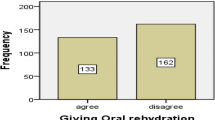Abstract
A pre and post comparison study was carried out in the field practice area of M.S. Ramaiah Medical College Bangalore, Karnataka to assess the impact of educational intervention on the knowledge of mothers of underfive children on home management of diarrhoeal diseases. Sample of 225 mothers were included in the study. The study was conducted in 3 stages. Stage I-initial knowledge, attitude and practice of mothers was assessed. Stage II-one to one educational intervention was conducted and supported by audiovisual aids and live demonstration. Stage III-included post intervention knowledge, attitude and practice after 2 months and 2 years. After the educational intervention, there was significant improvement on knowledge of mothers regarding definition of diarrhoea (P < 0.001), signs of dehydration (P < 0.001), awareness of ORS solution (P < 0.001), correct preparation of ORS solution (P < 0.001), shelf-life of ORS solution (P < 0.001), seeking health care (P < 0.001) and rational drug therapy during diarrhoea (P < 0.001). McNemar test was used to find out the change in knowledge before and after the educational intervention. The overall knowledge scores improved significantly after 2 months (P < 0.001) as well as 2 years (P < 0.001) of the educational intervention. Though the proportion of mothers retaining the knowledge at the end of 2 years dropped, yet there was significant improvement (P < 0.001) when compared to the baseline study.
Similar content being viewed by others
References
WHOReadings on Diarrhoea, Student Manual, 1992.
UNICEF,The State of the World’s Children. Oxford University Press, 1996.
WHOThe Management of Diarrhoea and Use of ORT, 2nd edn. A Joint WHO/UNICEF Statement, WHO, Geneva, 1985.
WHONinth Programme Report, 1992-1993, Programme for Control of Diarrhoeal Diseases, WHO/ CDD/94.46.
Garret, Woodworth.Statistics in Psychology and Education. Bombay; Vakils, Feffer and Simons Private Limited, 1967.
Kapoor P, Rajput VJ. Maternal knowledge, attitude and practices in diarrhoea.Indian Pediatr 1993; 30:85–88.
Anand K, Lobo J, Sundaram KR, Kapoor SK. Knowledge and practices regarding diarrhoea in rural mothers of Haryana.Indian Pediatr 1992; 29:914–917.
Fox KFA. Social marketing of ORT and contraceptives in Egypt.Technical Literature Update on Diarrhoea 1988 ; 7:1–2.
Kumar V, Kumar R, Raina N. Impact of ORT on maternal beliefs and practices related to acute diarrhoea.Indian J Pediatr 1989; 56:219–225.
Tirthankar Datta. Awareness about breast feeding, immunisation and oral rehydration.Indian Pediatr 1985; 22:929–930.
Sinha AK, Srivastava SP. Awareness of diarrhoeal disease control in rural and urban areas of Bihar.Indian Pediatr 1993; 30:1433–1439.
Taneja DK, Panna Lal, Aggarwal CS, Bansal A, Gogia V. Diarrhoea management in somejhuggi clusters of Delhi.Indian Pediatr 1996; 33:117–119.
Sanjay Chaturvedi, Minakshi Sandhir, Rajesh Bajpai. Compliance of mothers in home management of acute diarrhoea.Indian Pediatr 1996; 33:318–320.
WHO,The Management and Prevention of Dairrhoea, 3rd edn. 1993.
Shaw DD, Jacobsen CA, Konare KF, Isa AR. Knowledge and use of ORT for childhood diarrhoea in Tumpat District.Med J Malaya 1990; 45:304–309.
Viswanathan H, Rohde JE.Diarrhoea in rural India. A Nationwide Study of Mothers and Practitioners (All India Summary). New Delhi, Vision Books, 1990:38–74.
Muralidhar Tambe, Chandrashekar Y, Shivaram C. A study of community perceptions and practices regarding childhood diarrhoea in a rural community of Bellary Taluk.Karnataka Journal of Community Health 1991; 7:40–47.
WHO,The Rational Use of Drugs in the Management of Acute Diarrhoea in Children, 1990:1–3.
Author information
Authors and Affiliations
Corresponding author
Rights and permissions
About this article
Cite this article
Mangala, S., Gopinath, D., Narasimhamurthy, N.S. et al. Impact of educational intervention on knowledge of mothers regarding home management of diarrhoea. Indian J Pediatr 68, 393–397 (2001). https://doi.org/10.1007/BF02723009
Issue Date:
DOI: https://doi.org/10.1007/BF02723009




